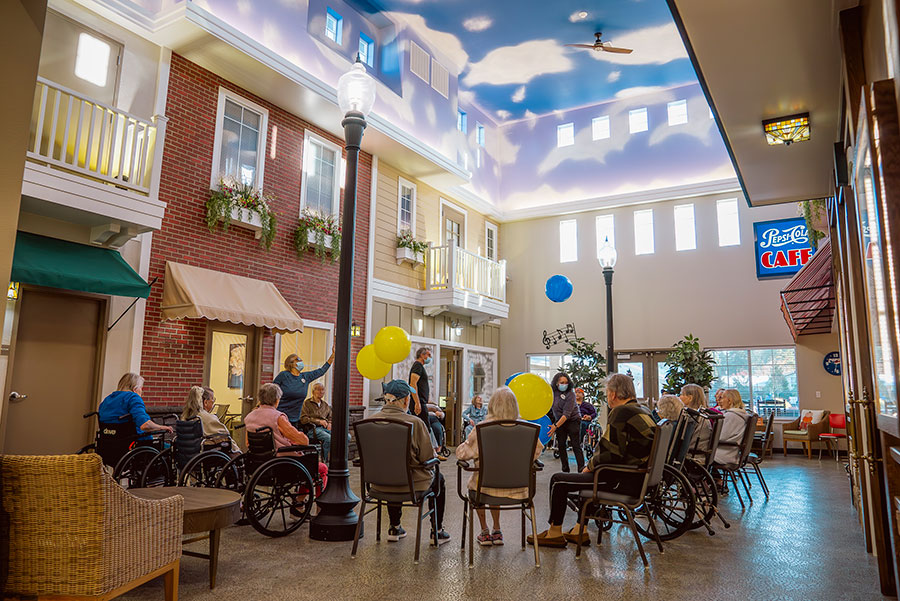Personalized Memory Care for Dementia in a Secure Space
Personalized Memory Care for Dementia in a Secure Space
Blog Article
All About Memory Treatment Solutions: Why Tiny Memory Care Houses Are an Excellent Selection
Memory treatment services play an important function in supporting people with Alzheimer's and mental deterioration. Small memory care homes stand apart for their customized approach and intimate setting. With reduced staff-to-resident proportions, these homes cultivate stronger connections and customized treatment. Locals gain from enhanced social communications and a safe setting. As family members check out options, comprehending the distinct advantages of tiny memory treatment homes comes to be essential. What variables should be taken into consideration when selecting the best home?
Comprehending Memory Care Services
While numerous might be familiar with basic senior treatment options, recognizing memory care services is vital for family members dealing with the difficulties of cognitive decline. Memory treatment particularly satisfies individuals with problems such as Alzheimer's illness and other forms of dementia. These solutions give an organized environment that concentrates on improving the quality of life for homeowners via specialized treatment and support.Memory care centers are designed to ensure security and security, commonly including protected settings to avoid wandering. Trained employee are available all the time to assist with everyday activities, drug management, and individual treatment. Furthermore, memory treatment programs frequently include cognitive stimulation activities, tailored to involve citizens and advertise mental wellness. Family members can profit from comprehending these services, as they allow informed choices concerning their liked ones' treatment, ensuring that their details requirements and preferences are dealt with in a caring and helpful fashion.
The Benefits of Small Memory Care Houses
Small memory care homes use distinctive benefits that can considerably improve the lifestyle for homeowners with cognitive disabilities. One significant benefit is the intimate setting, which enables personalized interactions among staff and homeowners. This smaller sized setting fosters meaningful relationships, minimizing sensations of seclusion and anxiousness typically experienced by people with memory issues.Additionally, the reduced staff-to-resident proportion in small memory treatment homes allows caretakers to give more alert guidance and assistance. This approach not just enhances security yet likewise advertises a complacency for the residents.Moreover, small memory care homes can adapt quickly to the one-of-a-kind needs and choices of each citizen, enabling a much more homey atmosphere. Such an environment can encourage social interaction and engagement in activities, inevitably enhancing the day-to-day experiences of those coping with cognitive problems.
Personalized Care Plans for Homeowners
Individualized care strategies are important in memory care homes, as they accommodate the special needs and preferences of each resident. These strategies begin with detailed analyses carried out by knowledgeable specialists, that assess cognitive capabilities, case history, and individual interests. This customized strategy guarantees that care is not only efficient however likewise respectful of each person's dignity and autonomy.Moreover, personalized care plans are flexible, permitting adjustments as citizens' demands advance with time. This versatility cultivates a complacency and familiarity, which is important for individuals coping with memory challenges. Caretakers are trained to carry out these plans continually, giving assistance that aligns with the locals' routines and preferences.Ultimately, customized care strategies improve the quality of life for residents by advertising independence, involvement, and well-being, making them an essential element of memory treatment services in small memory treatment homes.
Creating a Home-Like Atmosphere
Creating a home-like atmosphere is important for fostering comfort and familiarity in memory care settings, as it considerably affects citizens' emotional health. Little memory treatment homes typically prioritize customized touches, such as warm color schemes, family photos, and familiar furniture plans, which help locals really feel extra at convenience. Including components similar to a traditional home, like relaxing space and common areas, motivates a feeling of belonging.Moreover, using all-natural light and outdoor areas can enhance the atmosphere, advertising leisure and serenity. Employee play a substantial duty in maintaining this environment by involving with homeowners in a thoughtful way, treating them like family members. Regular activities, such as cooking or horticulture, can additionally add to a home-like feeling, providing possibilities for locals to take part in significant experiences. Overall, producing a supporting environment supports cognitive feature and psychological stability, making it an important facet of memory care solutions.
Improved Social Communication and Neighborhood
Boosted social interaction and community are crucial elements of memory treatment services. By fostering individualized social involvement and creating a family-like ambience, these solutions promote meaningful links among locals. Team events and activities further urge participation, helping people feel extra consisted of and sustained.
Individualized Social Involvement
While social interaction is crucial for total wellness, numerous people with memory problems often have a hard time to engage meaningfully with others. Individualized social engagement in memory care homes addresses this challenge by creating customized tasks that accommodate locals' unique passions and capacities. By concentrating on individual preferences, caregivers can promote links that reverberate deeply with each person. Activities such as art treatment, songs sessions, and assisted discussions promote cognitive stimulation and psychological expression. blog here Furthermore, little group settings urge friendship and permit for even more intimate communications, improving sensations of belonging. This method not just deals with sensations of seclusion yet likewise empowers residents to keep a sense of identity, inevitably adding to boosted mental health and wellness and lifestyle.
Family-like Atmosphere
In a memory treatment setup, cultivating a family-like atmosphere substantially boosts social communication and develops a feeling of community among residents. Smaller memory care homes frequently focus on intimate settings, allowing locals to form closer links with one an additional and team member. This nurturing environment advertises trust fund, which is crucial for individuals with memory disabilities. Locals are more likely to talk and share experiences, producing an encouraging network that minimizes sensations of loneliness. The experience of shared spaces and regimens adds to a sense of belonging, better motivating social communication (personalized memory care). In such settings, emotional bonds prosper, leading to enhanced total health and a higher top quality of life for citizens as they navigate their day-to-day experiences with each other
Team Activities and Events

Safety and Safety Features in Small Homes
Lots of small homes developed for memory care include important safety and safety features to ensure the health of locals. These homes usually use safe and secure entrance and leave points to avoid roaming, a typical worry among individuals with memory impairments. Additionally, monitoring systems and alarm system systems enhance surveillance, guaranteeing that staff can immediately react to any kind of uncommon activities.Interior formats are customized for safety and security, with minimized dangers such as clutter-free paths and sharp edges. Handrails and non-slip floor covering are normally mounted to decrease the threat of drops. Personnel are trained in emergency protocols, guaranteeing they are gotten ready for numerous situations.Moreover, personalized treatment strategies may consist of evaluation of private safety and security demands, giving tailored services for each citizen. Generally, these safety and security and protection functions create a nurturing setting where citizens can flourish while maintaining their dignity and self-reliance.
How to Choose the Right Memory Treatment Home
Just how can households guarantee they select the most suitable memory treatment home for their loved ones? The decision needs cautious consideration of numerous aspects. Households ought to assess the facility's team qualifications and training, making certain that caregivers are experienced in managing memory-related conditions. Next, it's crucial to analyze the home's setting, concentrating on safety and security features and whether it cultivates a sense of community and belonging. Going to the center can supply understanding right into day-to-day tasks and the social atmosphere, which are essential for psychological stimulation and psychological well-being. Additionally, households must ask about the treatment plans provided, ensuring they are tailored to individual demands. Taking into consideration the home's area and availability for household visits can add to a smoother shift. By resolving these aspects, households can make an educated choice that prioritizes their loved one's convenience and quality of life in a memory treatment setup.
Often Asked Concerns
What Certifications Should Personnel Members in Memory Care Residences Have?
Personnel members in memory care homes need to possess relevant accreditations, experience in mental deterioration treatment, solid interaction skills, and concern. Recurring training in behavior administration and therapeutic interventions improves their ability to sustain locals properly.
How Do Memory Care Solutions Differ From Typical Assisted Living?
Memory care services focus particularly on individuals with memory impairments, supplying specific assistance and organized settings. In comparison, typical assisted living offers general support with day-to-day activities, doing not have the customized technique necessary for those with cognitive difficulties.
What Kinds of Tasks Are Used in Memory Care Residences?
Memory care homes typically use a selection of activities made to engage citizens. Usual alternatives include art treatment, songs sessions, cognitive games, physical workouts, gardening, and social occasions, all targeted at improving wellness and cognitive function.
Can Locals Bring Their Own Items to Memory Care Houses?
Citizens can usually bring their very own valuables to memory care homes, allowing them to individualize their living space - personalized memory care. This practice helps create a familiar atmosphere, advertising convenience and a sense of identity for the individuals

Exactly How Are Member Of The Family Associated With the Care Refine?
Member of the family play a additional hints crucial duty in the treatment process, frequently taking part in decision-making, going to care conferences, and giving psychological support. Their participation cultivates a collaborative atmosphere, boosting the personalized memory care citizen's total health and quality of life. While lots of might be acquainted with basic elderly treatment alternatives, comprehending memory care solutions is necessary for families facing the difficulties of cognitive decline. These solutions give a structured atmosphere that focuses on improving the quality of life for homeowners with specialized treatment and support.Memory care facilities are made to assure safety and protection, usually including secured environments to prevent roaming. Individualized treatment strategies are important in memory care homes, as they provide to the special demands and choices of each resident. Staff members in memory treatment homes must possess appropriate certifications, experience in dementia care, strong communication skills, and empathy. Memory care services focus particularly on individuals with memory problems, supplying customized assistance and structured settings.
Report this page